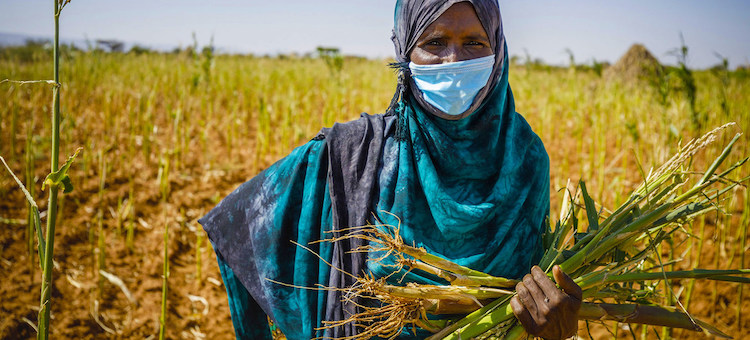By J Natranis
NEW YORK (IDN) — The COVID-19 pandemic has triggered a deeply troubling situation in the world’s poorest countries. It threatens to push the achievement of the Sustainable Development Goals (SDGs) another ten years further into the future, warns the Financing for Sustainable Development Report 2021 by more than 60 United Nations Agencies and international organizations. Because of the pandemic, the global economy has experienced the worst recession in 90 years. JAPANESE | THAI | TURKISH
This, in turn, is disproportionately affecting the most vulnerable segments of societies. An estimated 114 million jobs have been lost, and about 120 million people have been plunged back into extreme poverty.
“What this pandemic has proven beyond all doubt is that we ignore global interdependence at our peril. Disasters do not respect national boundaries,” UN Deputy Secretary-General Amina Mohammed said. “A diverging world is a catastrophe for all of us. It is both morally right and in everyone’s economic self-interest to help developing countries overcome this crisis.”
The highly uneven response to the pandemic has widened the already yawning disparities and inequities within and between countries and peoples. A historic US$16 trillion in stimulus and recovery funds helped to stave off the worst effects but spent less than 20 per cent of that sum in developing countries. By January this year, all but 9 of the 38 countries rolling out vaccines were developed countries, notes the report released on March 25, 2021.
It adds that nearly half of the least developed and other low-income countries were at high risk of or in debt distress before COVID-19, and, with falling tax revenues, the pandemic has sent debt levels soaring. Therefore, The following measures are necessary without any delay:
- Reject vaccine nationalism and step up contributions to the Access to COVID-19 Tools Accelerator to close the remaining funding gap of over $20 billion for 2021;
- Meet the 0.7% Official Development Assistance (ODA) commitment and provide fresh concessional financing for developing countries, especially LDCs;
- Avert debt distress by providing liquidity and debt relief support so developing countries can fight COVID-19 and its economic and social fallout.
“The growing gap between rich and poor countries is troublingly retrogressive and requires an immediate course correction,” said UN Under-Secretary-General Liu Zhenmin, Under-Secretary-General of the Department of Economic and Social Affairs, which produced the report.
“Countries must be helped to not only stay afloat financially but to invest in their own development. To rebuild better, both the public and private sectors must invest in human capital, social protection, and sustainable infrastructure and technology.”
Sustainable and smart investment, for example, in infrastructure, would reduce risks and make the world more resilient to future shocks. It would create growth; allow a better life for millions, and combat climate change.
For example, says the report, it is estimated that spending US$ 70-120 billion over the next two years, and US$ 20-40 billion annually thereafter, would significantly reduce the likelihood of another pandemic—contrasted with trillions of dollars of economic damages already from COVID-19.
However, unlike their developed counterparts, most developing countries do not have the fiscal space for such investment.
The report recommends ways to address this challenge, including:
- Provide ultra-long-term financing [e.g., over 50 years] to developing countries, at fixed interest rates, to take advantage of current historically low-interest rates;
- Better use public development banks as a tool for sustainable development investment;
- Reorient capital markets toward aligning with sustainable development by removing short-term incentives along the investment chain and mitigating the risk of SDG-washing.
The report further emphasizes that development that is not risk-informed will not be sustainable and presents the crisis’s response as an opportunity to reset and ‘future-proof’ global systems.
While gaps in the international financial architecture or inadequate policies often undermine financing for development, during the COVID-19 crisis, previous safeguards meant some systems held—notably the financial and banking systems, in part due to reforms after the 2008 banking failures. Lessons learned from today’s crisis can allow reforms to be put in place now to create future resilience.
The report also advises to:
- Find a global solution for taxation of the digital economy to combat corporate tax avoidance, reduce harmful tax competition, and better use technology to combat illicit financial flows.
- Create a global reporting framework to hold companies accountable for their social and environmental impact and incorporate climate risks into financial regulation.
- Review regulatory frameworks, such as antitrust regulations, to reduce the market power of large digital platforms.
- Modernize labour market and fiscal policies to reflect the reality of a changing global economy, including an increasingly digitalized world.
“To change trajectory, we need to change the rules of the game,” the UN Deputy Secretary-General Amina Mohammed said. “Relying on the pre-crisis rules will lead to the same pitfalls that have been revealed over the past year.” [IDN-InDepthNews – 01 April 2021]
Photo: Food systems in Africa have been adversely impacted by climate-induced shocks, conflicts and most recently, COVID-19. © FAO/Petterik Wiggers




